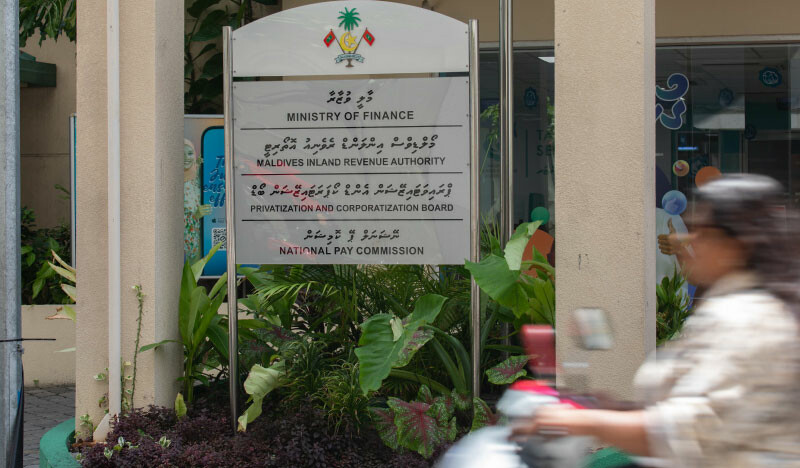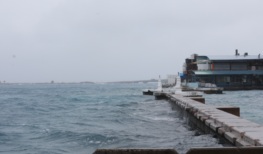Annual Financial Review Highlights Debt Pressures, Subsidy Reliance of SOEs

Photo: MV+
The Maldives’ State-Owned Enterprises (SOEs) have a substantial impact on the national economy, generating revenue, fostering employment, and providing essential public services. The recently published Annual Financial Review 2023 from the Privatization and Corporatization Board (PCB) outlines the sector’s growth, operational challenges, and areas needing reform. This analysis provides an in-depth look at the financial and governance performance of the Maldives’ SOEs, examining the fiscal challenges that emerged over the past year and assessing key metrics to understand the long-term implications for the country’s economy.
Sector Composition and Assets
The 2023 review analyses 30 SOEs across diverse sectors, including banking, aviation, utilities, transport, and real estate. Combined, these entities employed 34,659 individuals and held assets worth approximately MVR 220 billion. The most asset-intensive sectors, real estate and transport, contributed 54% of total assets, reflecting the government’s strategic investments in infrastructure and housing. In contrast, utilities and services represent a smaller, yet essential, portion of the asset pool, indicating a balanced distribution across different societal needs.
Liabilities and Financing Structure
While SOEs’ assets rose, so did their liabilities, reaching MVR 125 billion by the end of 2023. A significant part of these liabilities is financed through debt, including MVR 12.67 billion backed by sovereign guarantees. Notably, companies like Housing Development Corporation (HDC) and Maldives Airports Company Limited (MACL) had high debt-to-asset ratios of 50% or more, raising concerns about the sustainability of debt servicing, especially with rising interest rates in global markets.
A breakdown reveals that 27% of SOE liabilities relate to customer deposits in banking SOEs, a trend mainly driven by the Bank of Maldives (BML). With limited options for raising additional equity without further sovereign backing, these enterprises face the dual challenge of maintaining sufficient liquidity while managing a balanced debt structure to avoid over-leverage.
Revenue and Profitability Trends
Total revenue for the SOE sector increased by 13% to MVR 53 billion, reflecting resilience amid economic headwinds. However, profitability showed varied results across the sector. The Bank of Maldives led the way with a net profit of MVR 2,074 million, marking an increase from MVR 1,628 million in the previous year. Housing Development Corporation (HDC) and Maldives Airports Company Limited (MACL) also posted strong profits, benefiting from effective cost controls and targeted investments in infrastructure.
Despite these gains, several SOEs struggled to maintain profitability. For example, many of the government-supported enterprises, which rely on capital injections and subsidies, reported net losses. Waste Management Corporation (WAMCO), Fahi Dhiriulhun Corporation (FDC), and Addu International Airport faced steep challenges in balancing operational costs and revenue generation. This disparity between self-sufficient and government-supported SOEs underscores the need for structural reforms and perhaps greater financial autonomy to foster better financial health across the sector.
Government Contributions and Subsidies
The Maldivian government’s support for SOEs increased substantially in 2023, reaching MVR 4.95 billion, almost double the MVR 2.25 billion in 2022. This funding covered essential services in utilities, transport, and waste management, with key recipients like STELCO, Fenaka, and Maldives Transport and Contracting Company (MTCC). However, while these subsidies ensure affordable access to essential services for the public, the financial sustainability of dependent SOEs remains a pressing concern. Repeated capital injections can strain government resources, making it critical for SOEs to move toward self-sufficiency through improved operational efficiency and cost management.
Debt Profile and Risk
Sovereign-guaranteed loans, totalling MVR 12.67 billion, are a notable part of the SOE debt profile. These guarantees have allowed SOEs to secure financing on favourable terms, but the resulting debt burden poses fiscal risks. Entities like HDC, MACL, and STELCO, with high debt-to-equity ratios, face elevated financial risks that could require further government backing to prevent financial distress.
For companies such as Addu International Airport (AIA), debt ratios have become particularly problematic. AIA’s debt-to-equity ratio, for instance, reached an unsustainable level of -4290%, largely due to a low equity base. Without corrective measures, these debt levels threaten long-term viability and, if unaddressed, could strain government resources further, impacting fiscal policy and public debt levels.
Governance and Compliance
The report identifies compliance with corporate governance guidelines as a persistent issue within the SOE sector. In 2023, the average compliance rate was 68%, a slight improvement from the previous year but still highlighting governance challenges. Companies with compliance rates below 50% were flagged for immediate improvements, particularly in board oversight, audit completion, and financial reporting.
Efforts to enhance governance included the PCB’s introduction of the SOEs Directors’ Code of Conduct in October 2023, mandating the presence of at least one female board member in each SOE to promote diversity. Additionally, compliance with audit requirements has been emphasised, with many companies completing audits for multiple years to address previous delays. For instance, Tradenet Maldives Corporation finalised audits for 2021, 2022, and 2023 in a single year. The PCB’s stricter governance standards and audit mandates are expected to bolster transparency and accountability across the sector, although much remains to be done to standardise governance practices.
Audit Backlogs and Financial Reporting
Delayed audits remain a significant concern, with numerous SOEs failing to complete timely audits in 2023. The reasons cited include delayed submission of financial documents and insufficient internal audit resources, leading to protracted financial reporting cycles. These delays hinder transparency and impede timely decision-making, underscoring the need for SOEs to prioritise audit completion as part of their corporate governance. The PCB has encouraged SOEs to appoint qualified Chief Financial Officers and has collaborated with the Auditor General’s Office to reinforce financial reporting guidelines.
The ongoing backlog has impacted government-supported SOEs more acutely, with organisations like the Public Service Media (PSM) and Regional Airports Company Limited (RACL) experiencing chronic delays. Addressing these challenges is crucial for fostering investor confidence and enhancing SOE credibility in the domestic and international markets.
A Roadmap for Reform
The 2023 Annual Financial Review presents a comprehensive, if complex, picture of the Maldives’ SOE sector. The increased revenue and profitability in select entities demonstrate the potential for financial stability and growth. Yet, the rising liabilities, reliance on government subsidies, and governance issues highlight systemic risks.
Reforms aimed at enhancing operational efficiency, reducing debt dependency, and improving governance compliance could prove pivotal for long-term sustainability. Additionally, as the government continues to extend financial support to SOEs, establishing clearer pathways to self-sufficiency should become a priority. This shift would not only alleviate fiscal pressures on the state but would also enable SOEs to contribute more robustly to national development.
In the context of fiscal prudence and sustainable development, the Maldives’ SOEs stand at a critical juncture. Moving forward, embracing strategic governance reforms and promoting financial discipline will be essential in unlocking the sector’s potential while ensuring economic stability for the Maldives.






